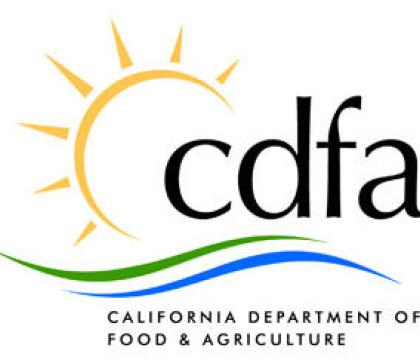2025 Environment and Policy Internships (EPIC): California Department of Food and Agriculture (CDFA)
Job Title: Climate and Working Lands Intern
Department/Team: Climate and Working Lands Team at the California Department of Food and Agriculture
Location: Sacramento, California (hybrid preferred)
Duration: 40 hours per week for ten weeks over the summer
Reports to: Virginia Jameson, Deputy Secretary for Climate and Working Lands
Areas of Interest: Agriculture, climate change, community engagement, natural climate solutions
About the California Department of Food and Agriculture:
The mission of the California Department of Food and Agriculture is to serve the citizens of California by promoting and protecting a safe, healthy food supply, and enhancing local and global agricultural trade, through efficient management, innovation and sound science, with a commitment to environmental stewardship.
Our vision is that we be recognized as the most highly respected agricultural agency in the world by leading and excelling in the programs and services delivered to meet the needs for the growing local and global food and agricultural system.
CDFA is a cabinet-level agency/department led by Secretary Karen Ross and headquartered in Sacramento. Interns would work with CDFA executive leadership to tackle emergent issues affecting agriculture, such as climate change, racial equity, sustainable pest management, food security, and more. Activities would include longer-term projects as well as short-term research assignments. Interns will gain skills and knowledge around public processes such as budgeting, program design, stakeholder engagement, policymaking, and communications.
About the Climate and Working Lands Team:
Deputy Secretary Jameson works closely with Dr. Nina Bingham, CDFA’s Climate Scientist, as well as a broader network of 30+ scientific staff within CDFA’s Office of Environmental Farming and Innovation, and other parts of the department.
Position Description/Scope of Work:
The incumbent would work with executive-level staff to advance first-of-a-kind programs and policy initiatives, participate in interdisciplinary, cross-cutting state initiatives, and obtain experience working at the intersection of science, policy, and management.
List of Potential Projects:
Projects may include contributions to CDFA’s Climate Resilience Strategy for California Agriculture, writing bill analyses, issuing memos, talking points, conducting data analysis on CDFA’s programs, public meeting set-up and management, social media creation, and more. This work takes place in an office environment, with in-person and virtual engagement with CDFA staff and other interested parties.
Desired Skills/Qualifications:
- Interest and ability to work on a team
- Experience or interest in learning more about interest-based stakeholder processes
- Strong communication, both written and verbal, and interpersonal and leadership skills
- Ability to think critically and develop innovative ideas
- Ability to manage multiple projects with tight deadlines
- Ability to understand and translate science for diverse audiences
- Ability to work effectively in a team and independently
Logistics:
- EPIC fellows are required to work full-time (35-40 hours per week) for 10 weeks over the summer, and will receive a stipend of $8,000 - $9,500, depending on financial need. This stipend is intended to help cover living and transportation expenses during the fellowship, which the student is expected to arrange and coordinate.
- Start and end dates are flexible (start date no later than July 7, 2025).
-
CDFA will provide a laptop computer and email address as well as a desk for the intern to use during their time with us.
2024 Stanford EPIC Fellow: Hailey Demars
Eligibility:
Stanford undergraduates from all academic disciplines are encouraged to apply, and applicants may vary in academic interests, public service involvement, and experience. Learn more about our previous EPIC cohorts! Students must be enrolled for winter and spring quarters of this year and be in good academic standing to be eligible for a fellowship. Applications will only be accepted from students who will be enrolled as undergraduates for the following academic year, so unfortunately, graduating seniors cannot apply. The one exception to this rule is seniors who will be working toward a co-term degree during the following academic year. Co-term students must be in the undergraduate billing group in spring quarter. Please refer to the Haas Center for Public Service's website for additional Cardinal Quarter Undergraduate Fellowship Program Policies and Requirements.
Note: students are only eligible for one Stanford-funded full-time experiential learning opportunity during the summer, and are not permitted to engage in another full-time internship, job, coursework, or volunteer opportunity. Students are responsible for arranging and paying for their own housing and transportation during the fellowship.
Requirements:
-
Spring Quarter:
- Commit to working full-time (35-40 hours week) for 10 consecutive weeks
-
Complete an online program orientation through the Haas Center for Public Service
- This will include designing a personal learning plan that you will share with your site supervisor and academic mentor
- Complete the Engaging in Ethical and Effective Service in-person workshop or worksheet
- Meet with your assigned Stanford academic mentor at least once prior to the start of the fellowship (more check-ins during and after your experience are encouraged)
- Attend EPIC cohort building events and activities in spring quarter, as your schedule allows
-
Complete and submit all required forms and paperwork
-
Summer Quarter:
- Engage in your full-time fellowship (starting no later than July 7, 2025; exact start date to be determined with your site supervisor)
- Attend EPIC cohort building events and activities in the summer, as your schedule allows
- Submit a mid-summer evaluation
-
Submit a final project report, complete a program evaluation, and correspond with donor(s) as requested by program staff
-
Fall Quarter:
- Debrief with your academic mentor at least once
- Attend a de-briefing meeting for the purpose of reflecting upon and evaluating summer experiences
- Participate in outreach activities to share your experiences and help publicize the program
